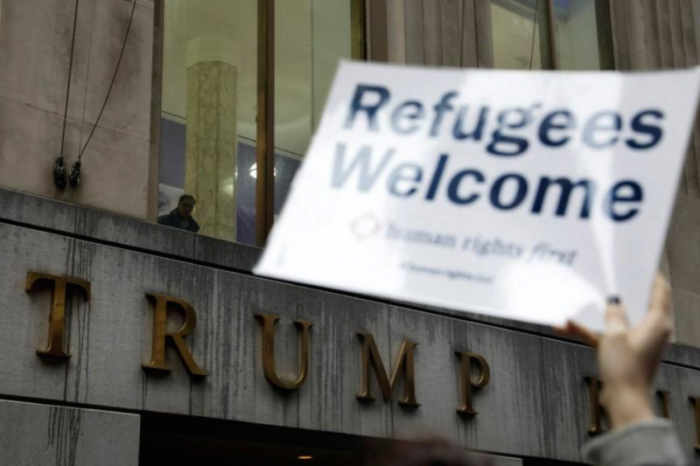2,600 evangelicals urge governors to continue refugee resettlement after Trump order

Over 2,600 evangelicals called on their state governors this past week to consent to resettle refugees in their borders following an executive order signed by President Donald Trump requiring approval from state and local officials before refugees can be resettled.
The evangelical refugee resettlement agency World Relief and the Evangelical Immigration Table, a coalition of evangelical organizations seeking comprehensive immigration reform, led an effort this past week to send joint letters to 15 state governors.
The letters call for the officials to permit the continued resettlement of refugees through the U.S. refugee admissions program in accordance with Trump’s Sept. 26 executive order giving states and localities the ability to block refugee resettlement.
So far, 17 of the nation’s 50 governors have indicated that they will continue to allow refugee resettlement in the U.S., according to World Relief.
One of the letters, which was signed by 294 evangelicals in the state, was sent to Arizona Republican Gov. Doug Ducey before he gave consent last Friday to refugee resettlement in Arizona’s borders.
Another letter, signed by 136 evangelicals in North Carolina, was sent to Democrat Gov. Roy Cooper, who gave his consent for resettlement in the Tar Heel State to the U.S. State Department on Tuesday.
Other letters were sent to governors in California, Florida, Georgia, Iowa, Illinois, Indiana, Ohio, Oklahoma, South Carolina, Tennessee, Texas, Washington and Wisconsin.
The letter warned state leaders that disruptions to the resettling process in their states could impact the “reunification of many families who have been waiting years to be reunited.”
The letters stress that if states block resettlement in their borders, families looking to be reunited will likely exercise their right to move to those states once they are resettled in the U.S.
But in doing so, the letters stated, refugees will be forced to “move away from vital employment assistance, language acquisition and cultural adjustment resources offered by their resettlement organization.”
“Refugees can best integrate into the U.S. and quickly become financially self-sufficient when supported both by their family and by a local resettlement office,” the form letters state.
“As our state’s governor, we urge you to keep the option open for local communities within [the state] to continue to receive newly arrived refugees. As always, we are committed to praying for you as you lead our state.”
The letters received a combined total of 2,669 signatories, including 659 on the letter to Tennessee Republican Gov. Bill Lee, 340 on the letter to Texas Gov. Greg Abbott and 231 on the letter to Georgia Gov. Brian Kemp.
“After being forced to leave their countries to escape war, persecution or natural disaster and being legally allowed entry to the U.S., the last thing refugees should have to experience is being denied access to communities in which they wish to dwell,” World Relief President Scott Arbeiter said in a statement. “Halting the resettlement of refugees to states will disrupt families and could lead to the end of vital ministries by local churches.”
Consent from local and state officials will be required beginning on June 1, 2020. Agencies must submit proposals to the State Department by Jan. 21, 2020.
One state of concern in Texas, which is among the leading states in terms of refugees resettled in the past decade.
Texas has resettled over 80,000 refugees since 2002, according to Pew Research. Texas joined liberal states California, New York and Washington in hosting about a quarter of the refugees resettled in the U.S. in the fiscal year 2019.
As a conservative governor, Abbott hasn’t offered any indication so far on whether or not he will consent to refugee resettlement.
Another state of concern is Georgia, which resettled 1,000 refugees in the fiscal year 2019 as the Atlanta suburb of Clarkston, Georgia is home to thousands of refugees.
Gov. Kemp has not given an indication about whether he will consent to refugee resettlement. However, Kemp made headlines during his 2018 campaign in which he joked that he owns a truck "in case I need to up round criminal illegals."
“[W]e hope and pray that the governors in other states will carefully consider the thousands of their constituents who are voicing their desire to serve and embrace refugees in their communities,” Arbeiter added in his statement.
In November, three faith-based refugee resettlement organizations filed a lawsuit against Trump’s order, arguing that it gives state and local authorities a “veto” power that “conflicts with the statutory scheme enacted by Congress and core principles of federalism.”
Critics of the order say it allows for the possibility that one politician can stand in the way of resettling refugees in communities that are willing and ready to accept them.
As Trump’s executive order also requires local governments to consent to refugee resettlement, the New York Times reports that it does not yet appear that any local government has taken the step to refuse consent for refugee resettlement.
But on Monday, a North Dakota county commission voted 3-2 to limit the number of refugees it will take each year to no more than 25. The vote of the Burleigh County Commission came after it initially signaled that it could be the first locality to outright ban resettlement in its borders.
North Dakota’s Republican Gov. Doug Burgum announced last month that the state would continue resettling refugees, but only in localities where it has received approval.
According to the Associated Press, Burleigh County only received 24 refugees in the fiscal year 2019, after only 22 in the fiscal year 2018.
Chairman Brian Bitner told media that at least 12 local church leaders wrote in support of the resettlement program.
“Refugee resettlement is not only the right thing to do, but it is good for Burleigh County and North Dakota,” Bishop David Kagan of the Roman Catholic Diocese of Bismarck wrote in a letter to commissioners, according to AP.
Follow Samuel Smith on Twitter: @IamSamSmith
or Facebook: SamuelSmithCP




























